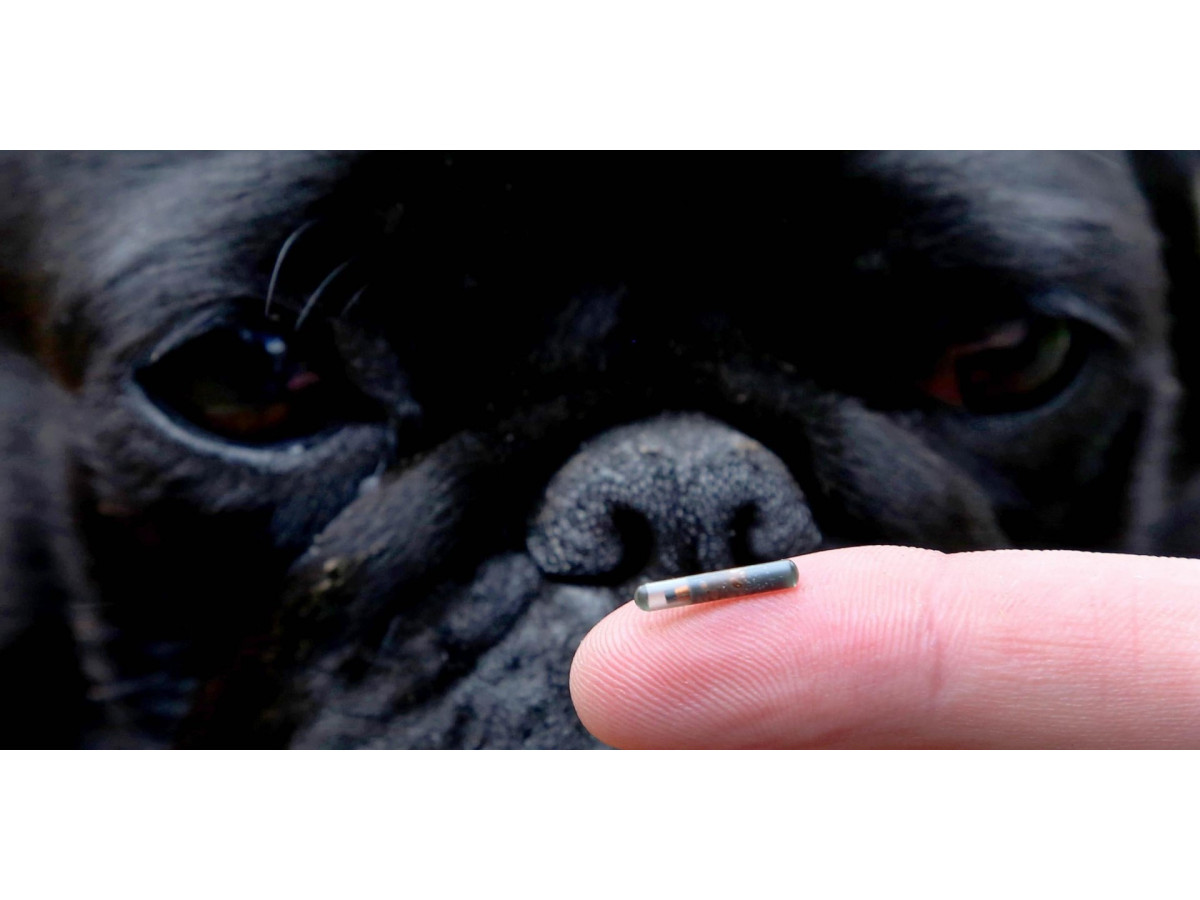Chipping: What Is It and How Does It Work?

Pet chipping is becoming increasingly more popular with dog owners. Not only is it a great way to increase your Frenchie's safety level, but it also adds an extra chance of finding them if they run away. Before deciding whether to microchip your puppy or not, it is essential to understand the characteristics of the process.
What Is Chipping?
The procedure involves implanting a microprocessor into the body of your French Bulldog. It might sound intrusive, but there is nothing to worry about, as this small operation is 100% safe for your Frenchie. Chipping is neither difficult nor painful, and will not be traumatic for your pup. The electronic chip has a 15-digit identification code, which will be assigned to your Frenchie.
Of course, each such number is unique to the pet, and it complies with applicable regulations and standards. The procedure for chipping a Frenchie is similar to an injection. In the vast majority of cases, the microprocessor is placed between the shoulder blades or on the pup's neck. It is worth emphasizing that the implantation occurs only once in a lifetime: due to the lack of an expiration date, there is no need to repeat this process. The chip will work as long as your four-legged friend will live.
How the chip works
Chips implanted in French Bulldogs work on the basis of radio waves, which ensures high efficiency. The identification code can only be read using a special device that most veterinarians possess. The number is checked in the database, in which the Frenchie's profile and their owner's can be seen. Chipping your Frenchie makes sense whenever there is a risk of theft and you want to minimize it.
Furthermore, the absence of an identification number can lead to the placement of your pup in a shelter. Many owners have unfortunately never managed to find their unchipped runaway pets, and chipping greatly increases your chances of finding them.
Registering a Dog Chip
Not everyone knows how and where to register a dog identification number. It is a fairly easy task; The code must be entered into the database, since only then will it serve its purpose and be able to help identify your Frenchie. Note that there are several databases, both national and international, and they may differ from one another.
There is no database better than the rest, and where you decide to register the chip is an individual question that depends on what you believe is best for you and your pet. The different databases could become an obstacle for a person who is trying to establish the owner of a found pup. They need to check the number in several different databases, and you can never be sure that the owner will eventually be found. If the Frenchie has changed owners or moved to a new home, it is important to update the personal databases, since the previous owner may not know where the new owner lives.
How Much Does A Dog Chip Cost?
If you are considering microchipping your Frenchie, you must first find a veterinarian who offers such services. The exact cost depends on the price list of the clinic or of a private doctor. Of course, the professionalism and qualifications of the doctor play an important role in the provided price. You should choose a veterinarian who follows all standards and that has all the necessary licenses and permits.Entering an identification number into the database is usually also a payable service, and as a one-time fee, there will be no need to pay it multiple times.
If you want the data to be stored in several databases, you will have to pay several times. Keep in mind that the registration of the chip is sometimes already included in the price offered by the veterinarian. Free databases also exist, and while they are not as popular, you can still register your French Bulldog's chip number in them as well.

Can A Chip Track Your Frenchie?
The chip improves your pet's safety, but you should be aware that it does not work as a GPS module, meaning you will not be able to track the location of your Frenchie in real-time. Only the person who found them will be able to read the identification number - for example, in a veterinary clinic - and then try to find it in the database.
Thus, the finder will be able to obtain data about the owner of the pup and contact them. For those interested in tracking their French Bulldog in real time, consider investing in a GPS collar. GPS collars can help track your pet's movements and can be found online and in pet stores. However, such collars are not always reliable, so choose carefully before purchasing.
Is It Possible To Change The Owner Data?
Do not forget to update the data in the database if you received a Frenchie already with a chip - you must enter new information about yourself, the owner. Otherwise, you will not be able to find your pup if the need to do so arises. Fortunately, this does not require any special formalities, so there should not be any serious issues when doing so. If you decide to give away a chipped French Bulldog, you should also ensure that your contact details are no longer listed in the database. Re-registration is not required, so you do not have to worry about additional costs.
Does The Chip Cause Pain?
The pain associated with the implantation of the chip under the skin is comparable to the sensations of a conventional injection. Of course, the procedure cannot be called pleasant, but it also does not cause any particular suffering. The procedure takes up to several minutes, then the discomfort disappears. Chipping is much less painful than branding. Most often, a microprocessor is inserted under the skin in puppyhood, but nothing prevents an adult Frenchie from getting a microchip inserted. Local anesthesia is typically used for such a procedure.
Is It Necessary To Chip Your Pet?
Chipping your Frenchie is not mandatory, but the procedure is considered very convenient in many ways. It is not too expensive and rather affordable. It is also likely that in the event of a loss of your pup, chipping will play a decisive role. Failure to trace the owner can result in your French Bulldog being adopted or put in a shelter. The chip cannot 100% guarantee the return of your French Bulldog since it does not work as a GPS module, and everything ultimately depends on the person who found your pooch.
However, chipping increases the likelihood of the successful return of the pet to their respective owner. A chip could also come in handy if you are planning a trip abroad with your furry companion. An animal identification number is required to obtain a passport, and here there are two options: either a chip implanted under the skin, or a traditional brand (tattoo). Chipping is typically recommended since branding is much more painful for the pet.
Is A Dog Chip Safe?
Chips that veterinarians implant in Frenchies comply with a number of norms and standards. Therefore, you can be completely sure that it is absolutely safe for your pup. In addition, the procedure is extremely simple - you do not have to worry about complications and side effects. It should be emphasized that the microprocessor does not affect the French Bulldog's health and well-being in any way.
An undoubted advantage is that the chip is invisible to Frenchies and their owners. A person petting a chipped dog may only feel a small bump under the skin. Even in the case that the microprocessor is slightly displaced, it is not dangerous for the Frenchie and does not affect their health.
Chipping a pet ultimately depends on the owner's decision. While it is not mandatory, chipping is highly recommended as it increases the chances of finding a lost pet, as well as letting the pet travel abroad with their owner and family.







